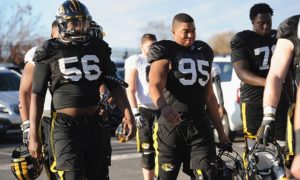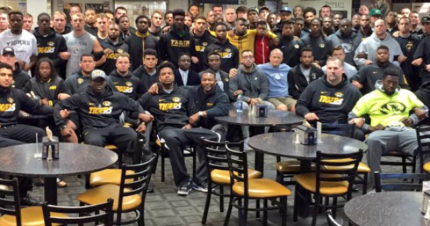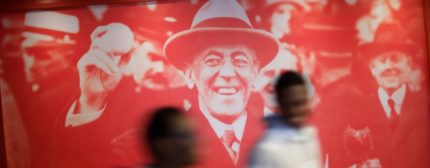
Members of the University of Missouri football team return to practice on in Columbia, Mo. (Michael B Thomas/Getty Images)
A Missouri legislator has proposed a new law that would strip Black college student athletes of their political power.
The law was inspired by the actions of the University of Missouri football team who went on strike to protest President Tim Wolfe’s poor handling of racial problems on campus. The football team’s protest eventually led to Wolfe’s resignation.
According to the The Guardian, the bill, co-sponsored by State Rep. Kurt Bahr, curtails student athletes’ ability to protest political or social issues. According to the bill, any student athlete who refuses to play for non-health related issues could lose their scholarship. Also, any coach who supports or encourages a strike by a student athlete would be subject to a fine.
The proposed legislation would go into effect in August 2016. However, it’s unsure how the law would be enforced since the athletic department doesn’t use state funds. According to the student handbook, “[T]hus, similar to private business, the Mizzou Athletics Department must operate solely from what revenue it generates. “ Bahr told The Columbia Missourian he had never read the student handbook.
Ian Simon, a former member of the Mizzou football team who led the protest, criticized the proposed bill. He said the bill sees student athletes as jocks who shouldn’t have a political opinion.
“They want to call us student athletes. But they keep us out of the student part of it. I’m more than just a football player … As soon as we’re done playing at the University of Missouri, the University of Missouri does not care about us anymore. We are not their responsibility … Our sport is just a small part of who we are,” said Simon.
According to The Guardian, the football team was motivated to act because they were concerned about the health of Jonathan Butler, a University of Missouri student who had gone on hunger strike to protest Wolfe’s lack of action.
The University of Missouri football team’s action showed how much power black college athletes have. College athletic programs are huge moneymaking ventures and any potential strike would interrupt that revenue stream.
“It (the strike) struck an economic blow at Tim Wolfe’s chance of keeping his job,” said Dave Zirin, a sports columnist with The Nation in an interview with Democracy Now! last month. “If the team had forfeited its game this weekend against BYU, the school would have had to write a check for $1 million. That’s more than twice what Tim Wolfe makes in a year.”
Zirin said the strike showed how much leverage student athletes have in the multibillion dollar world of college sports. In recent years, there has been an increase in college athletes flexing their political muscle. Players at Northwestern University tried to create a union and players at Grambling University complained about their working conditions. Zirin said the University of Missouri football team’s strike could set a precedent for future political activity.
“I think what it does is it lays a handbook, really, for campus activists around the country, particularly at these big state schools, to say, ‘Let’s talk to the athletes,'” Zirin said. “Let’s not see them as living in this separate space. Let’s actually try to connect with them. Let’s hear their grievances and see if they’re willing to hear ours, as well.’”


